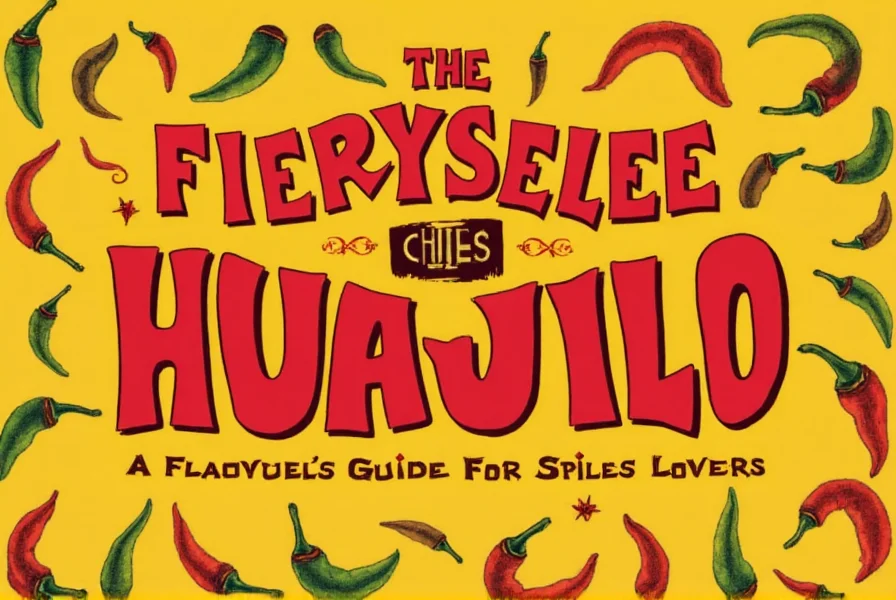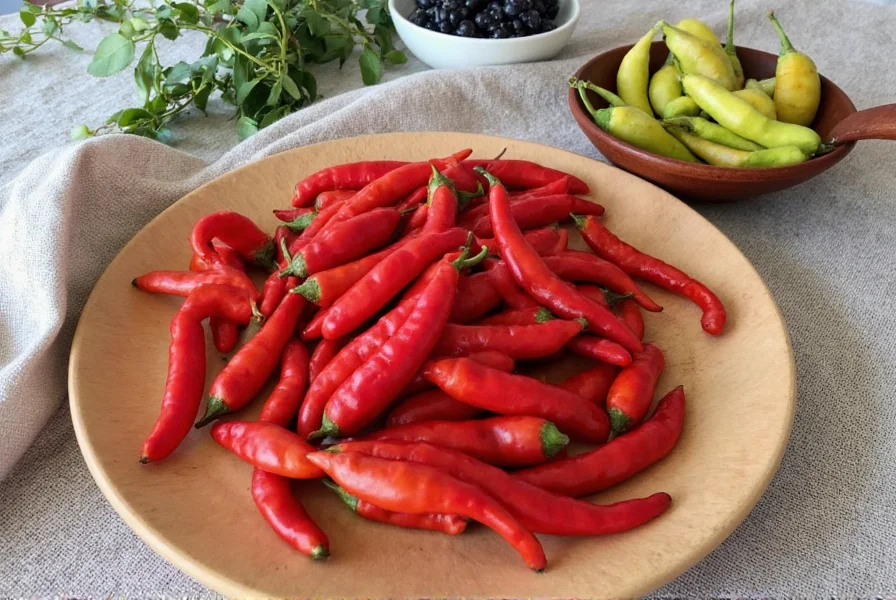Table of Contents
Introduction to Guajillo Chiles
Guajillo chiles (sometimes misspelled as 'huajillo') are a staple dried chili pepper native to Mexico, prized for their mild to medium heat level and complex smoky, slightly sweet flavor. They are essential in authentic Mexican cuisine, particularly for mole sauces, salsas, and stews. With a Scoville rating of 2,500–5,000 SHU, they offer balanced heat without overwhelming spice, making them versatile for both traditional and modern dishes.
Understanding the Flavor Profile
Guajillo chiles deliver a rich, earthy taste with subtle fruity notes and a hint of tanginess. Their flavor profile is often described as smoky, sweet, and slightly acidic, which pairs well with tomatoes, garlic, and chocolate in sauces. Compared to other common chilies, they provide a more nuanced heat than jalapeños while being milder than chipotles.
| Chili Type | Heat Level | Flavor Profile | Best Used For |
|---|---|---|---|
| Guajillo Chiles | Mild to medium | Smoky, slightly sweet, earthy | Sauces, stews, marinades |
| Ancho | Mild | Winy, sweet, fruity | Stews, salsas, moles |
| Poblano | Mild | Earthy, grassy | Stuffed peppers, salsas |
| Jalapeño | Mild to medium | Peppery, tangy | Snacks, salsas, grilled dishes |
Culinary Uses and Recipes
Guajillo chiles are incredibly versatile and form the backbone of many Mexican dishes. Here are popular ways to use them:
- Mole sauce: Guajillo chiles add depth and richness to this iconic sauce, balancing sweetness and spice.
- Salsa: Toasted and blended guajillo chiles create a smoky, complex salsa perfect for tacos or chips.
- Marinade: Use them in a spice rub for meats or vegetables to infuse subtle heat and flavor.
- Stew: Add them to slow-cooked stews for a warm, earthy undertone.
Buying Guide: How to Choose the Best Guajillo Chiles
When shopping for guajillo chiles, focus on quality indicators to ensure authentic flavor:
Key Features to Look For
- Appearance: Choose plump, dark red chilies with a slight sheen and no cracks or mold.
- Smell: Fresh chiles should have a strong, earthy aroma without sour or rancid notes.
- Texture: Avoid overly dry or brittle chilies, as they may lack flavor potency.
For reliable sources, look for guajillo chiles at Mexican grocery stores, specialty spice shops, or trusted online retailers like Amazon. Prioritize vendors with clear sourcing information and positive customer reviews for consistent quality.
Cooking Tips and Techniques
Maximize the flavor of guajillo chiles with these expert techniques:
- Toasting: Dry-toast chiles in a skillet over low heat for 1–2 minutes per side to enhance smokiness before use.
- Soaking: Soak dried chiles in hot water for 20–30 minutes to soften them for blending or grinding.
- Grinding: Use a spice grinder or mortar and pestle to create a fine powder for sauces or rubs.
- Pairing: Combine with tomatoes, garlic, cumin, and chocolate for layered, authentic Mexican flavors.
A sentence that expands on guajillo chiles: These chiles are not just a flavor enhancer—they're a cultural staple that brings warmth, tradition, and depth to every dish they touch.
Frequently Asked Questions
What are guajillo chiles?
Guajillo chiles are dried, medium-heat chili peppers native to Mexico. They are known for their smoky, slightly sweet flavor and earthy notes. The name 'guajillo' comes from Nahuatl, meaning 'little gourd,' referring to their shape. 'Huajillo' is a common misspelling.
How hot are guajillo chiles on the Scoville scale?
Guajillo chiles range from 2,500 to 5,000 Scoville Heat Units (SHU), placing them in the mild to medium category. This makes them significantly milder than habaneros but hotter than ancho chiles, with a balanced heat that enhances rather than overwhelms dishes.
What can I use as a substitute for guajillo chiles?
Good substitutes include ancho chiles (for sweeter, milder flavor), pasilla chiles (for similar smokiness), or a mix of dried New Mexico chiles and a pinch of cayenne for heat. Avoid using chipotles, as they are much hotter and smokier.
How should I store guajillo chiles?
Store dried guajillo chiles in an airtight container in a cool, dark place. Properly stored, they maintain flavor for 6–12 months. For longer storage (up to 2 years), keep them in the freezer to preserve volatile flavor compounds.
Do I need to remove the seeds from guajillo chiles?
Removing seeds is optional. Seeds contain most of the heat, but guajillo chiles are naturally mild, so leaving them in adds flavor without excessive spice. For extra mildness, remove seeds and veins before soaking or toasting.
What dishes are guajillo chiles commonly used in?
Guajillo chiles are essential in traditional Mexican mole sauces, salsas, adobos, and stews. They also work well in modern recipes like chili, soups, and even desserts where subtle heat is desired. Their versatility makes them a pantry staple for authentic Mexican cooking.
Conclusion
Guajillo chiles are more than just a chili—they're a gateway to the rich, complex flavors of Mexican cuisine. Whether you're experimenting in the kitchen or simply looking to elevate your meals, these chilies offer a unique blend of smokiness, sweetness, and balanced heat that can transform any recipe. With the right techniques and a little creativity, you can unlock the full potential of this culinary treasure.












 浙公网安备
33010002000092号
浙公网安备
33010002000092号 浙B2-20120091-4
浙B2-20120091-4